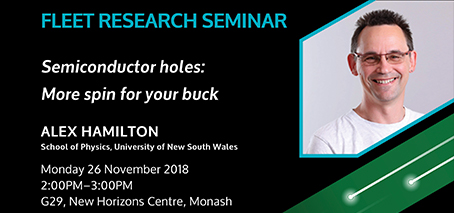-
26 Nov 2018
2:00 pm - 3:00 pm
Semiconductor holes: More spin for your buck
Scientia Professor Alex Hamilton. University of New South Wales, Sydney
All welcome! The seminar flyer can be downloaded clicking on this link
Abstract:
There is enormous interest in using the spins of electrons and holes for applications in spintronics, spin-based quantum computing, and topological electronics. However it is often not appreciated that in semiconductors valence band holes are spin-3/2 particles, which gives them very different properties to spin-1/2 electrons. This talk will describe why holes are so different to electrons, with two examples:
1. Holes in two-dimensional quantum wells: Most electronic devices are based upon 2D electron (or hole) systems in which the spin properties, such as the response to an external magnetic field, are set by the materials parameters at the time the crystal is grown, and cannot be manipulated over a wide range. Here we demonstrate a new mechanism for electrically controlling the Zeeman spin splitting of holes in a GaAs quantum well, tuning the spin-splitting by over 300%. In addition we introduce a novel method for extracting the g-factor of 2D holes from the magnetoresistance oscillations. [1]
2. Holes in one dimensional quantum wires: Recently there has been great interest in topological superconductivity and zero energy Majorana modes, which can be engineered by combining semiconductor quantum wires, spin orbit interaction, and superconductivity. A pre-requisite for forming Majorana modes is a low disorder one-dimensional system with strong spin-orbit interactions. I will present studies of 1D hole systems, where the spin-orbit interaction is many times stronger than in electron systems, opening a new pathway to topological superconductivity [2,3,4].
[1] E. Marcellina, …, A. R. Hamilton, Electrical Control of the Zeeman Spin Splitting in Two-Dimensional Hole Systems, Physical Review Letters 121, 077701 (2018).
[2] H. J. Suominen, M. Kjaergaard, A.R. Hamilton, …, Zero-Energy Modes from Coalescing Andreev States in a Two-Dimensional Semiconductor-Superconductor Hybrid Platform, Phys. Rev. Lett. 119, 176805 (2017).
[3] D.S. Miserev, … A.R. Hamilton, and O.P. Sushkov, Mechanisms for Strong Anisotropy of In-Plane g-Factors in Hole Based Quantum Point Contacts, Physical Review Letters 119 (2017).
[4] A. Srinivasan,… A.R. Hamilton Detection and Control of Spin-Orbit Interactions in a GaAs Hole Quantum Point Contact, Physical Review Letters 118 (2017).
About the speaker:
UNSW Scientica Professor Alex Hamilton is a leading expert on the study of holes in semiconductor nanostructures and has contributed significantly to the understanding of electronic conduction in two-dimensional and nanoscale transistors. His work has been recognised through two Australian scientific prizes, an Australian Professorial Fellowship, an ARC Outstanding Researcher Award, a UNSW Scientia Professorship and election as a Fellow of the American Physical Society. Professor Hamilton leads the Quantum Electronic Devices group in the UNSW School of Physics. He is Deputy Director of FLEET and leader of Research Theme 1, where he directs the program on artificially engineered topological materials. Additionally, he works with Research Theme 2 to realise bilayer exciton transistors at room temperature.
Venue: G29 New Horizons Centre, Monash University
Venue Website: https://www.monash.edu/engineering/our-research/facilities/new-horizons
Address:

